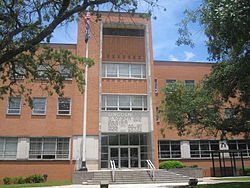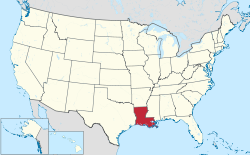Lincoln Parish (French: Paroisse de Lincoln) is a parish located in the U.S. state of Louisiana. As of the 2020 census, the population was 48,396.[1] The parish was created on February 24, 1873, from parts of Bienville, Claiborne, Union, and Jackson parishes, and its boundaries have changed only once (in 1877). This makes Lincoln Parish one of the Reconstruction parishes.[2]
Lincoln Parish, Louisiana | |
|---|---|
 Lincoln Parish Courthouse in Ruston | |
 Location within the U.S. state of Louisiana | |
 Louisiana's location within the U.S. | |
| Country | |
| State | |
| Region | North Louisiana |
| Founded | 1873 |
| Named for | Abraham Lincoln |
| Parish seat (and largest city) | Ruston |
| Area | |
• Total | 1,220 km2 (472 sq mi) |
| • Land | 1,220 km2 (472 sq mi) |
| • Water | 2 km2 (0.7 sq mi) |
| • percentage | 0.5 km2 (0.2 sq mi) |
| Population (2020) | |
• Total | 48,396 |
| • Rank | LA: 25th |
| • Density | 40/km2 (100/sq mi) |
| Time zone | UTC-6 (CST) |
| • Summer (DST) | UTC-5 (CDT) |
| Area code | 318 |
| Congressional district | 5th |
| Website | Parish of Lincoln |


The parish seat was Vienna from the parish's creation in 1873 until 1884, when a parish-wide vote moved it to the new railroad town of Ruston.[3][4][5][6][7]
Lincoln Parish comprises the Ruston micropolitan statistical area.
History
editSince the late 20th century, archeologists have dated eleven sites in northern Louisiana where thousands of years ago, indigenous cultures built complexes with multiple, monumental earthwork mounds during the Middle Archaic period, long before the development of sedentary, agricultural societies. At sites such as Watson Brake, Frenchman's Bend, and Caney, generations of hunter-gatherers worked for hundreds of years to build and add to mound complexes. Hedgepeth Site, located in Lincoln Parish, is dated about 5200–4500 BP (about 3300–2600 BCE), from the latter part of this period. Such finds are changing the understanding of early human cultures.[8]
The parish was one of several new ones established by the state legislature during Reconstruction; in 1873 it was formed from land that had belonged to Bienville, Claiborne, Jackson and Union parishes to create one in which newly elected representatives might have more ties to the Republican Party. It was an attempt to break up the old order of political power, and to capitalize on the arrival of the railroad line. The parish is named for the late U.S. president Abraham Lincoln.[9]
Lincoln Parish is usually Republican in contested elections. In 2012, Republican presidential nominee Mitt Romney won the parish with 10,739 votes (56.5 percent) to U.S. President Barack H. Obama, the Democrat who polled 7,956 ballots (41.9 percent).[10]
Geography
editAccording to the U.S. Census Bureau, the parish has a total area of 472 square miles (1,220 km2), of which 472 square miles (1,220 km2) is land and 0.7 square miles (1.8 km2) (0.2%) is water.[11]
Major highways
edit- Interstate 20
- U.S. Highway 63
- U.S. Highway 80
- U.S. Highway 167
- Louisiana Highway 33
- Louisiana Highway 146
Adjacent parishes
edit- Union Parish (north)
- Ouachita Parish (east)
- Jackson Parish (south)
- Bienville Parish (southwest)
- Claiborne Parish (northwest)
Communities
editCities
editTowns
editVillages
editUnincorporated communities
edit- Corinth
- Mount Zion
- Pleasant Hill
- Hico
- Hilly
- Unionville
Demographics
edit| Census | Pop. | Note | %± |
|---|---|---|---|
| 1880 | 11,075 | — | |
| 1890 | 14,753 | 33.2% | |
| 1900 | 15,898 | 7.8% | |
| 1910 | 18,485 | 16.3% | |
| 1920 | 16,962 | −8.2% | |
| 1930 | 22,822 | 34.5% | |
| 1940 | 24,790 | 8.6% | |
| 1950 | 25,782 | 4.0% | |
| 1960 | 28,535 | 10.7% | |
| 1970 | 33,800 | 18.5% | |
| 1980 | 39,763 | 17.6% | |
| 1990 | 41,745 | 5.0% | |
| 2000 | 42,509 | 1.8% | |
| 2010 | 46,735 | 9.9% | |
| 2020 | 48,396 | 3.6% | |
| U.S. Decennial Census[12] 1790-1960[13] 1900-1990[14] 1990-2000[15] 2010[16] | |||
| Race | Number | Percentage |
|---|---|---|
| White (non-Hispanic) | 25,672 | 53.05% |
| Black or African American (non-Hispanic) | 18,626 | 38.49% |
| Native American | 145 | 0.3% |
| Asian | 682 | 1.41% |
| Pacific Islander | 5 | 0.01% |
| Other/Mixed | 1,512 | 3.12% |
| Hispanic or Latino | 1,754 | 3.62% |
As of the 2020 United States census, there were 48,396 people, 17,712 households, and 10,407 families residing in the parish.
Education
editLincoln Parish residents are zoned to Lincoln Parish School Board schools.
The parish is home to Louisiana Tech University in Ruston, and Grambling State University in Grambling.
Bethel Christian School is located in Ruston.
Ruston High School is located in Ruston.
Lincoln Preparatory School is located in Grambling.
Choudrant Elementary School and Choudrant High School are located in Choudrant.
Cedar Creek (K - 12) is located in Ruston
National Guard
edit527th Engineer Battalion (Triple Alpha) ("Anything, Anytime, Anywhere") is headquartered in Ruston, Louisiana, the parish seat. This battalion is part of the 225th Engineer Brigade of the Louisiana National Guard.
Attractions
edit- Eddie G. Robinson Museum
- Lincoln Parish Park
- Louisiana Military Museum
- Lincoln Parish Museum
- Dixie Center for the Arts
- North Central Louisiana Arts Council
- Ruston Community Theatre
- Celebrity Theatre (movie theater)
- Annual Peach Festival held in Ruston
- Annual Chicken Festival held in Dubach
- Kingdom Collectives Film Festival held in Ruston
Politics
edit| Year | Republican | Democratic | Third party(ies) | |||
|---|---|---|---|---|---|---|
| No. | % | No. | % | No. | % | |
| 2024 | 11,248 | 61.95% | 6,627 | 36.50% | 282 | 1.55% |
| 2020 | 11,311 | 58.68% | 7,559 | 39.22% | 405 | 2.10% |
| 2016 | 10,761 | 57.64% | 7,107 | 38.07% | 801 | 4.29% |
| 2012 | 10,739 | 56.54% | 7,956 | 41.89% | 298 | 1.57% |
| 2008 | 10,680 | 55.69% | 8,292 | 43.23% | 207 | 1.08% |
| 2004 | 10,791 | 59.23% | 7,242 | 39.75% | 185 | 1.02% |
| 2000 | 9,246 | 55.86% | 6,851 | 41.39% | 454 | 2.74% |
| 1996 | 6,973 | 43.98% | 7,903 | 49.85% | 979 | 6.17% |
| 1992 | 7,220 | 43.60% | 7,205 | 43.51% | 2,136 | 12.90% |
| 1988 | 8,853 | 60.40% | 5,427 | 37.03% | 377 | 2.57% |
| 1984 | 9,087 | 61.81% | 5,432 | 36.95% | 182 | 1.24% |
| 1980 | 7,515 | 55.79% | 5,598 | 41.56% | 357 | 2.65% |
| 1976 | 6,828 | 57.05% | 4,971 | 41.53% | 170 | 1.42% |
| 1972 | 6,736 | 69.15% | 2,589 | 26.58% | 416 | 4.27% |
| 1968 | 2,643 | 29.77% | 2,009 | 22.63% | 4,225 | 47.59% |
| 1964 | 5,766 | 77.09% | 1,714 | 22.91% | 0 | 0.00% |
| 1960 | 2,766 | 54.14% | 1,051 | 20.57% | 1,292 | 25.29% |
| 1956 | 2,676 | 59.20% | 1,014 | 22.43% | 830 | 18.36% |
| 1952 | 3,074 | 60.48% | 2,009 | 39.52% | 0 | 0.00% |
| 1948 | 353 | 11.03% | 625 | 19.53% | 2,223 | 69.45% |
| 1944 | 1,032 | 37.71% | 1,705 | 62.29% | 0 | 0.00% |
| 1940 | 449 | 13.14% | 2,969 | 86.86% | 0 | 0.00% |
| 1936 | 201 | 8.53% | 2,154 | 91.43% | 1 | 0.04% |
| 1932 | 163 | 7.87% | 1,908 | 92.13% | 0 | 0.00% |
| 1928 | 670 | 39.16% | 1,041 | 60.84% | 0 | 0.00% |
| 1924 | 157 | 13.46% | 1,005 | 86.19% | 4 | 0.34% |
| 1920 | 183 | 15.61% | 989 | 84.39% | 0 | 0.00% |
| 1916 | 42 | 4.29% | 932 | 95.30% | 4 | 0.41% |
| 1912 | 3 | 0.39% | 644 | 84.51% | 115 | 15.09% |
See also
editReferences
edit- ^ "Census - Geography Profile: Lincoln Parish, Louisiana". Retrieved January 21, 2023.
- ^ "" + theTitle + "". Archived from the original on March 29, 2015. Retrieved January 22, 2015.
- ^ "A bill has passed both Houses..." The Ouachita Telegraph. February 15, 1873. p. 3. Retrieved May 12, 2024.
- ^ "AN ACT Creating the parish of Lincoln, aud providing for the organization thereof". Bossier Banner-Progress. August 9, 1873. p. 1. Retrieved May 12, 2024.
- ^ "The people of Lincoln parish..." The Donaldsonville Chief. October 25, 1884. p. 1. Retrieved May 12, 2024.
- ^ "The people of Lincoln parish..." The Donaldsonville Chief. November 15, 1884. p. 1. Retrieved May 12, 2024.
- ^ "Find a County". National Association of Counties. Retrieved June 7, 2011.
- ^ Robert W. Preucel, Stephen A. Mrozowski, Contemporary Archaeology in Theory: The New Pragmatism, John Wiley and Sons, 2010, p. 177
- ^ Gannett, Henry (1905). The Origin of Certain Place Names in the United States. U.S. Government Printing Office. p. 187.
- ^ "Lincoln Parish election returns, November 6, 2012". staticresults.sos.la.gov. Retrieved November 17, 2012.
- ^ "2010 Census Gazetteer Files". United States Census Bureau. August 22, 2012. Archived from the original on September 28, 2013. Retrieved September 1, 2014.
- ^ "U.S. Decennial Census". United States Census Bureau. Retrieved September 1, 2014.
- ^ "Historical Census Browser". University of Virginia Library. Retrieved September 1, 2014.
- ^ "Population of Counties by Decennial Census: 1900 to 1990". United States Census Bureau. Retrieved September 1, 2014.
- ^ "Census 2000 PHC-T-4. Ranking Tables for Counties: 1990 and 2000" (PDF). United States Census Bureau. Archived (PDF) from the original on March 27, 2010. Retrieved September 1, 2014.
- ^ "State & County QuickFacts". United States Census Bureau. Archived from the original on June 6, 2011. Retrieved August 10, 2013.
- ^ "Explore Census Data". data.census.gov. Retrieved December 29, 2021.
- ^ Leip, David. "Dave Leip's Atlas of U.S. Presidential Elections". uselectionatlas.org. Retrieved March 7, 2018.
